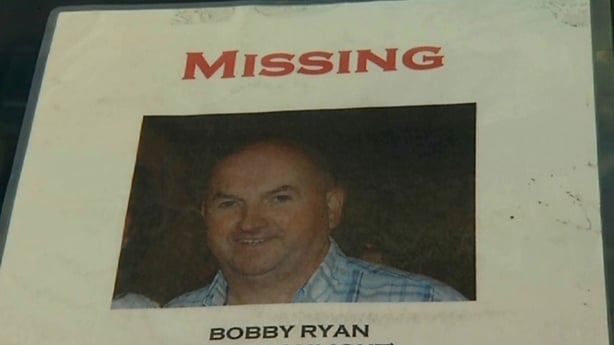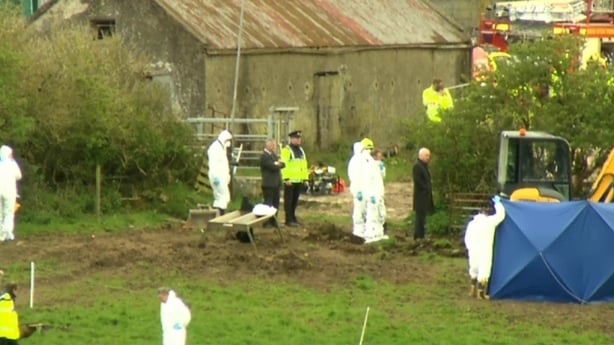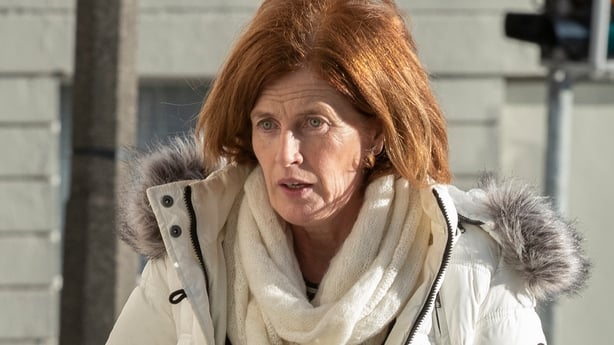A 50-year-old farmer has been found guilty of murdering his so-called love rival.
Patrick Quirke, from Breanshamore, Co Tipperary, had denied the murder of 52-year old Bobby Ryan, a part-time DJ known as "Mr Moonlight".
After a 15-week trial, the jury delivered its verdict after 20 hours and 39 minutes of deliberation, which began last Tuesday afternoon.
There was no reaction from Quirke as the guilty verdict was read out. Members of Mr Ryan’s family cried and hugged in the body of the court.
Ms Justice Eileen Creedon offered her condolences to the Ryan family and sentenced Quirke to life in prison.
Mr Ryan disappeared on 3 June 2011 after he left his girlfriend Mary Lowry’s farm early in the morning.
The trial heard his badly decomposed body was discovered nearby in an underground tank by Quirke on 30 April 2013.
Reading her victim impact statement to the court today, Mr Ryan’s daughter Michelle said that the day her father went missing was the "day our lives and the world as we knew it was torn apart".
She said that the torment was constantly with the family.
Ms Ryan said when they close their eyes at night, the family pictured "daddy with fear in his eyes".
She said what happened to him "has consumed our lives completely".
Ms Ryan said they hope "daddy will now rest in peace", adding that he would never be forgotten.
She finished her victim impact statement speaking directly to her father, saying "so until we meet again Moonlight, just know how much you are loved and sorely missed by us every day."
We need your consent to load this rte-player contentWe use rte-player to manage extra content that can set cookies on your device and collect data about your activity. Please review their details and accept them to load the content.Manage Preferences
Read more
- Quirke - The murder trial that shocked the country
- What the Quirke trial jury didn't hear
- How did Bobby Ryan die?
The prosecution said Quirke killed Mr Ryan and later staged the discovery of his remains because his lease on the farm was coming to an end and he feared the body would be discovered by someone else.
Prosecutors said the trial was about "love and money" and that Quirke was financially and emotionally dependent on Mrs Lowry, so he tried to sabotage her relationship with Mr Ryan.
They said he wanted Mr Ryan out of the way so he could resume his relationship with Mrs Lowry.
The jury heard their affair was briefly rekindled after Mr Ryan’s disappearance.
The case was based on circumstantial evidence. Prosecuting counsel Michael Bowman told the jury there was "no smoking gun or act caught on CCTV".
The prosecution could not say the exact time or location of the killing and had not identified a murder weapon.
But Mr Bowman said the individual pieces of evidence when put together like strands of a rope would "logically communicate the guilt of the accused".
He said the prosecution evidence established motive, opportunity and the state of mind of the accused man.
The jury was told that Quirke was unhappy because his relationship with the Mrs Lowry had ended and she had begun a relationship with Mr Ryan.
Mr Ryan was a quarry worker and part-time DJ known as "Mr Moonlight".

Mr Bowman said Mr Ryan could offer Mrs Lowry what Quirke could not, a conventional, normal relationship. Quirke was married, whereas Mr Ryan was separated.
Quirke had been best friends with Mrs Lowry's late husband and after his death he offered her support and help on the farm and their friendship developed into a relationship.
The relationship ended, but Quirke continued to have access to the farm under a seven-year lease agreement.
Mr Ryan disappeared after leaving Mrs Lowry's house in the early hours of 3 June 2011. Searches took place after his car was found near a wooded area.
His daughter had noticed the car was left open with his DJ equipment inside, it was parked in gear and the driver's seat was not in its usual position.

Mr Bowman told the court that Quirke had the motive and the opportunity to murder Mr Ryan.
He said the only person who could have put the body in the disused run-off tank was a person who knew about its existence and he suggested that was Quirke. Only a handful of people knew about the existence of the tank, he said.
Mr Bowman said it was the prosecution's case that he had got rid of his love rival and resumed his relationship with Mrs Lowry once Mr Ryan was out of the way.
In April 2013, two years after Mr Ryan disappeared, Quirke told gardaí he had been pumping water from the disused tank when he discovered the body.
Mr Ryan's decomposed body had been stripped naked and left in the tank, covered with a concrete slab.
A post-mortem examination showed he had died from blunt force trauma. He had multiple fractures to his skull and to his ribs and leg.

The prosecution said Quirke had staged and orchestrated the discovery of the body because the clock was ticking on his lease of the farm.
It said he wanted to remain in control and after staging the discovery of the body began a "narrative" aimed against Mrs Lowry in which he questioned her knowledge about the circumstances of Mr Ryan’s disappearance.
Prosecutors suggested Quirke had a prepared script from which to work off in his garda interviews.
They said an A4 sheet of paper found during a search of his home contained evidence of indentations from another page on which a number of things seemed to have been written, including questions about Mrs Lowry and statements about disposal of evidence. It also contained the words "what the guards will know".
Gardaí also found evidence that a home computer had been used to search for the rate of decomposition of human remains in water.
The prosecution said this "could not be explained away" and it would be an affront to common sense to find him not guilty.
The defence had argued the case against Quirke was based on a theory and not on any hard evidence.

It had warned the jury against taking a shortcut to conviction based on circumstantial evidence.
Senior counsel Bernard Condon said the case was forensically barren and the investigation was "sub optimal".
He said there was not one whit of evidence about what actually happened to Mr Ryan on 3 June 2011.
The defence had argued at the completion of the prosecution’s evidence that the absence of hard evidence against Quirke should render the case unsafe to be put before the jury for consideration.
"The essential matter in this case is what happened to Bobby Ryan ... and on that essential matter there is actually no evidence, good, bad or indifferent," Mr Condon submitted to the court.
Ms Justice Eileen Creedon had refused the application from the defence to have the trial stopped.
After closing arguments from the prosecution and the defence, she urged the jurors to look on the evidence in the case with a critical mind.
They could only convict if they were confident it was the right decision and had no reasonable doubt.
The judge said circumstantial evidence could be powerful, but said the jury should examine it with care.
She said they could draw inferences from the evidence, but must not speculate or fill in gaps. To convict, they had to be satisfied that Quirke had unlawfully killed Mr Ryan and that he had intended to kill or cause serious injury to him, she said.
After returning the majority verdict finding Quirke guilty, Ms Justice Creedon thanked the jurors for their service and told them they were exempt from jury service for life.
The jury began deliberating last Tuesday afternoon.
Additional reporting Laura Hogan







